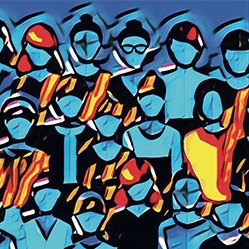Gail Weiss
Professor of Philosophy
George Washington University
Curating Embodied Resistance Through Social Media: The Role of Virtual Audiences in the Fight for Social Justice
This paper revisits Butler’s account of the political power of street protests as intercorporeal performative actions that enact “the collective will of the people,” in light of Ahmed’s and Medina’s reminders of how frequently performatives become nonperformatives when they don’t receive proper uptake. Heeding this reminder forces us to follow closely what happens not only before and during a protest, but what happens after it takes place. While the number of people who turn up in the streets to march for social justice is usually the primary barometer that is used to assess its success, it is the political impact the protest has (or fails to have) over time, that is the truer measure of its performative power. Virtual audiences can serve as epistemic activists, I argue, by assuming responsibility for how social justice protests are portrayed and disseminated through social media. What voices are we amplifying as we click and scroll through our daily newsfeeds, liking and sharing posts with one another? This is an urgent ethical question we need to be asking given the ever-growing power online audiences have, simply through the touch of their fingers, to increase or decrease a social protest’s transformative effects.

